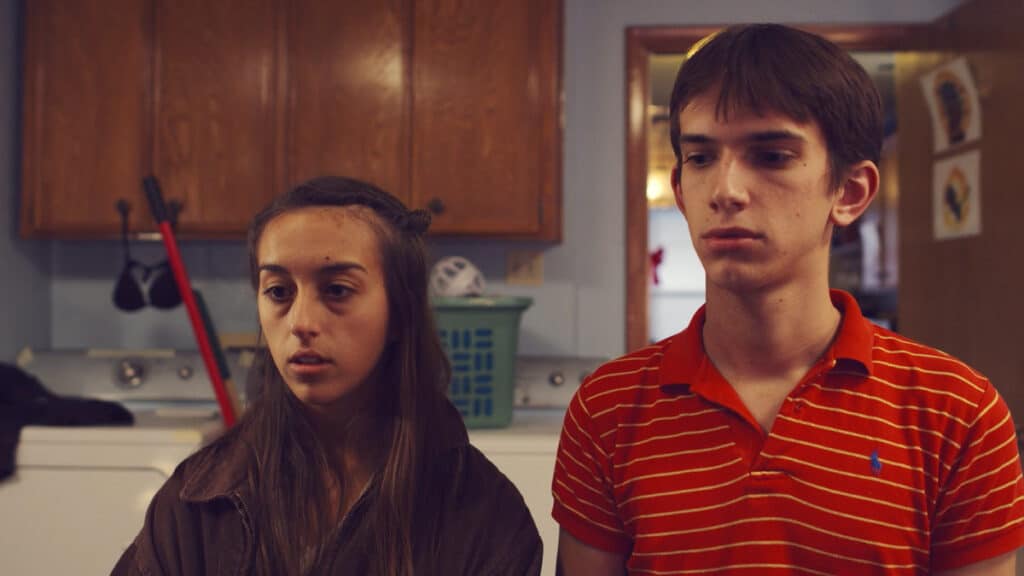Call Me Brother (2018) is an independent comedy, written by Christina Parrish and directed by David Howe. As the film opens, we meet Lisa (Christina Parrish) and Tony (Andrew Dismukes). Lisa and Tony are siblings who belong to a family that has been separated by divorce. Lisa lives with their mother, Rachel (Kim Lowery), while Tony lives with their father Frank (Asaf Ronen) and his live-in girlfriend Doris (Danu Uribe). On this particular weekend however, Lisa is staying in the family home while her mother takes care of some kind of business.
When the two are reunited for the weekend, they get along like a house on fire, spending all their time together. Yes, this brother and sister team are close. Perhaps a little too close. See, Tony and Lisa are both good kids, and mostly normal. A little awkward to be sure, but they aren’t deviants or anything like that. Yet, there is an electricity between the two that they are both aware of, and that neither one can ignore.

The weekend progresses, and the two do all kinds of stuff together. They go to the park, they reminisce, they hang out with Tony’s pals, Brian (Nick Saverino) and Ched (Enzo Priesnitz), etc. Every time the two are alone however, they find themselves in situations where they are in close personal proximity to one another, with the heat between the two of them intensifying. Each time this happens, one of them abruptly shuts the situation down, which is simultaneously relieving, and frustrating. They both know that they shouldn’t be attracted to each other, and yet, they can’t seem to not be.
As the weekend inexorably careens towards its conclusion, the heat between Lisa and Tony intensifies. Any resistance either one of them has to their mutual attraction breaks down a little more each time they find themselves alone and in close quarters. However, with the clock ticking down, the two are running out of opportunities to capitalize on their taboo amorousness. Is it really lust? Will others with a romantic interest in Lisa and/or Tony manage to channel their libidinous leanings into less morally questionable avenues? Are they really brother and sister? And most importantly, will they bang? All these questions and more will be answered by the conclusion of Call Me Brother.
This one came out of left field for sure. I didn’t quite know what to make of this film for most of it. However, by it’s conclusion I really liked it. It is a quirky (please forgive me for using the “q” word), idiosyncratic indie comedy. As such it took a little time for me to key into exactly what the film was trying to provide. My mind tried to stuff it into extant boxes constructed from previous viewings. There were comparisons to Napoleon Dynamite (Jared Hess, 2004) and pretty much every Wes Anderson film. However, these comparisons weren’t completely apt.
I mean, those kind of comparisons are slightly unavoidable when dealing with a film such as Call Me Brother. After all, Napoleon Dynamite, and pretty much every Wes Anderson film have been game-changers for quirky, idiosyncratic comedies, bringing the arthouse to the googleplex with sensational results. However, beyond a couple small similarities, Call Me Brother is uniquely its own animal, and deserves more than to be thought of as a Napoleon Dynamite knockoff.
In fact, on the subject of comparisons, Call Me Brother brought to mind even more eclectic fare. Sleeping Dogs Lie (Bobcat Goldthwait, 2006), A Serbian Film (Srdjan Spasojevic, 2010), and Dogtooth (Yorgos Lanthimos, 2009) all came to mind. Call Me Brother takes on a subject that is taboo AF, in a fearless and provocative way, the way these other films did. Only, Call Me Brother is funnier than all of them. Well, Dogtooth might be funnier in a cosmic sense. But I wasn’t laughing at Dogtooth the way I was laughing at Call Me Brother. When it comes to A Serbian Film, the only joke is on the audience.

I don’t mean to suggest that Call Me Brother has any kind of serious aim. At least none other than to fuck with their audience and make them laugh. I don’t think that behind the laughter, the film is an appeal to society to reconsider the way in which we deal with incest and/or incestuous relationships. In fact, quite the opposite. The film works best when poking us right in the same sensibilities which tell us that we definitely do not want to bang our brothers and sisters. This is something that the film mines for maximum effect. Making us wonder to ourselves “they aren’t really going to bang, are they?” The film is wonderfully manipulative in this way.
Even during scenes that are not charged with sexual heat Call Me Brother is really funny. It is a more deadpan style of humor, most of it coming from the characters themselves rather than from gags. Every character in the film is slightly warped in their own special way, and that makes for a lot of hilarious interactions. It’s one of those movies like A Serious Man (Ethan Coen, Joel Coen, 2009), where it isn’t super funny the first time you watch it. It isn’t until thinking about it the next day, and then possibly revisiting it that one realizes how funny it really is. At least, that’s how it worked for me. Watching Call Me Brother a second time had me laughing at stuff I didn’t laugh at the first time, and laughing harder at the stuff I did.
You know what else was great about this movie? The cast. Absolutely flawless casting. I’m not sure whether Christina Parrish wrote this thing with herself in mind to play the lead or not. Regardless, she was perfect in the role. As was Andrew Dismukes. He and Parrish had fantastic chemistry with one another. They were both believable and endearing enough that I was totally on their side, yet they both possessed an awkwardness that made their plight seem utterly plausible.
The supporting cast was great too. Tony’s peer group was over-the-top and stupid in such a way that I wished they could have been in more of the movie. Nick Saverino almost steals every scene he his in. His character is believably pathetic enough to make us feel sympathy for him, even though he is totally crass. Albeit in a hilarious manner. Everyone in the film really adds to the overall vibe and feel of things. Lisa and Tony’s weirdness seems totally appropriate, given the weirdness of all of the inhabitants of the Call Me Brother universe.
I don’t want to fawn over this flick too hard. After all, it’s no Dersu Uzala (Akira Kurosawa, 1975). However, in addition to the solid script, confident direction, exquisite cast, and superb management of what must have been a smaller budget, Call Me Brother also has great cinematography. Often times, films with lower budgets look like they have lower budgets. Call Me Brother manages to avoid this pitfall through the clever use of wide angle lenses, and camera placement. Many of the shots are lit quite beautifully, and the color grade isn’t ostentatious. Occasional POV shots put us inside the minds of the characters from time to time, heightening the tension. I had completely forgotten that this was an independent feature before too long. The cinematography played a big hand in that.

One more thing before I go. The soundtrack to this film was really fucking cool too. Not the score, but the source music. I don’t know how much of the budget went into the music they licensed, but every song they used was ideal for the scene in which it was used. This is rare as well. The majority of films feature music in some capacity. Some more than others. And some use it better than others. I, Tonya (Craig Gillespie, 2017) for example is a perfect example of how films can misuse music, to the detriment of the picture at large. That flick beat us over the head with big hit, after big hit, every 30 fucking seconds. It quickly went from tiresome to annoying to this-shit-is-taking-me-completely-out-of-the-picture.
On the other hand, loathe as I may be to admit it, Guardians of the Galaxy (James Gunn, 2014) did the same thing I, Tonya did, only Gunn had the taste and good sense to not push the envelope too far. A lesson that I, Tonya could have benefited from learning. Now, Call Me Brother doesn’t lean on the soundtrack in the same way as Guardians of the Galaxy did. However, a song has got to be right for the scene. It’s just like that time Dave Grohl reminded the world why Ringo Starr was a good drummer. He played what was right for the song. Something any great musician does. It works the same in film. And it totally works here as well. I really appreciated the good taste on display here.
So there you have it. I loved this flick. It might not be for everyone. Comedies that deal with taboo subjects rarely are. For those who are less puritanical however, Call Me Brother was a pleasant surprise. A great script, from a fresh voice, that isn’t afraid to do what it needs to do, all anchored by great performances. Call Me Brother is a comedy that will not only receive repeat viewings from this viewer, but one that I will heartily recommend to anyone with the grapefruits to inquire. It’s funny, it’s creepy, it’s sweet. It is odd, provocative, and endearing. It is a story about true love, and how it conquers all. Hopefully, it will conquer your heart the way it did mine.
Review
Rating
RN Review of Call Me Brother
Call Me Brother was a pleasant surprise. A great script, from a fresh voice, that isn't afraid to do what it needs to do, all anchored by great performances.




